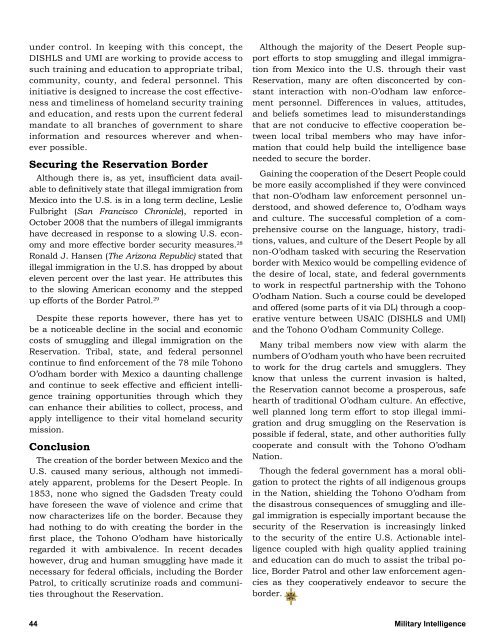Military Intelligence Professional Bulletin - Federation of American ...
Military Intelligence Professional Bulletin - Federation of American ...
Military Intelligence Professional Bulletin - Federation of American ...
Create successful ePaper yourself
Turn your PDF publications into a flip-book with our unique Google optimized e-Paper software.
under control. In keeping with this concept, the<br />
DISHLS and UMI are working to provide access to<br />
such training and education to appropriate tribal,<br />
community, county, and federal personnel. This<br />
initiative is designed to increase the cost effectiveness<br />
and timeliness <strong>of</strong> homeland security training<br />
and education, and rests upon the current federal<br />
mandate to all branches <strong>of</strong> government to share<br />
information and resources wherever and whenever<br />
possible.<br />
Securing the Reservation Border<br />
Although there is, as yet, insufficient data available<br />
to definitively state that illegal immigration from<br />
Mexico into the U.S. is in a long term decline, Leslie<br />
Fulbright (San Francisco Chronicle), reported in<br />
October 2008 that the numbers <strong>of</strong> illegal immigrants<br />
have decreased in response to a slowing U.S. economy<br />
and more effective border security measures. 28<br />
Ronald J. Hansen (The Arizona Republic) stated that<br />
illegal immigration in the U.S. has dropped by about<br />
eleven percent over the last year. He attributes this<br />
to the slowing <strong>American</strong> economy and the stepped<br />
up efforts <strong>of</strong> the Border Patrol. 29<br />
Despite these reports however, there has yet to<br />
be a noticeable decline in the social and economic<br />
costs <strong>of</strong> smuggling and illegal immigration on the<br />
Reservation. Tribal, state, and federal personnel<br />
continue to find enforcement <strong>of</strong> the 78 mile Tohono<br />
O’odham border with Mexico a daunting challenge<br />
and continue to seek effective and efficient intelligence<br />
training opportunities through which they<br />
can enhance their abilities to collect, process, and<br />
apply intelligence to their vital homeland security<br />
mission.<br />
Conclusion<br />
The creation <strong>of</strong> the border between Mexico and the<br />
U.S. caused many serious, although not immediately<br />
apparent, problems for the Desert People. In<br />
1853, none who signed the Gadsden Treaty could<br />
have foreseen the wave <strong>of</strong> violence and crime that<br />
now characterizes life on the border. Because they<br />
had nothing to do with creating the border in the<br />
first place, the Tohono O’odham have historically<br />
regarded it with ambivalence. In recent decades<br />
however, drug and human smuggling have made it<br />
necessary for federal <strong>of</strong>ficials, including the Border<br />
Patrol, to critically scrutinize roads and communities<br />
throughout the Reservation.<br />
Although the majority <strong>of</strong> the Desert People support<br />
efforts to stop smuggling and illegal immigration<br />
from Mexico into the U.S. through their vast<br />
Reservation, many are <strong>of</strong>ten disconcerted by constant<br />
interaction with non-O’odham law enforcement<br />
personnel. Differences in values, attitudes,<br />
and beliefs sometimes lead to misunderstandings<br />
that are not conducive to effective cooperation between<br />
local tribal members who may have information<br />
that could help build the intelligence base<br />
needed to secure the border.<br />
Gaining the cooperation <strong>of</strong> the Desert People could<br />
be more easily accomplished if they were convinced<br />
that non-O’odham law enforcement personnel understood,<br />
and showed deference to, O’odham ways<br />
and culture. The successful completion <strong>of</strong> a comprehensive<br />
course on the language, history, traditions,<br />
values, and culture <strong>of</strong> the Desert People by all<br />
non-O’odham tasked with securing the Reservation<br />
border with Mexico would be compelling evidence <strong>of</strong><br />
the desire <strong>of</strong> local, state, and federal governments<br />
to work in respectful partnership with the Tohono<br />
O’odham Nation. Such a course could be developed<br />
and <strong>of</strong>fered (some parts <strong>of</strong> it via DL) through a cooperative<br />
venture between USAIC (DISHLS and UMI)<br />
and the Tohono O’odham Community College.<br />
Many tribal members now view with alarm the<br />
numbers <strong>of</strong> O’odham youth who have been recruited<br />
to work for the drug cartels and smugglers. They<br />
know that unless the current invasion is halted,<br />
the Reservation cannot become a prosperous, safe<br />
hearth <strong>of</strong> traditional O’odham culture. An effective,<br />
well planned long term effort to stop illegal immigration<br />
and drug smuggling on the Reservation is<br />
possible if federal, state, and other authorities fully<br />
cooperate and consult with the Tohono O’odham<br />
Nation.<br />
Though the federal government has a moral obligation<br />
to protect the rights <strong>of</strong> all indigenous groups<br />
in the Nation, shielding the Tohono O’odham from<br />
the disastrous consequences <strong>of</strong> smuggling and illegal<br />
immigration is especially important because the<br />
security <strong>of</strong> the Reservation is increasingly linked<br />
to the security <strong>of</strong> the entire U.S. Actionable intelligence<br />
coupled with high quality applied training<br />
and education can do much to assist the tribal police,<br />
Border Patrol and other law enforcement agencies<br />
as they cooperatively endeavor to secure the<br />
border.<br />
44 <strong>Military</strong> <strong>Intelligence</strong>
















